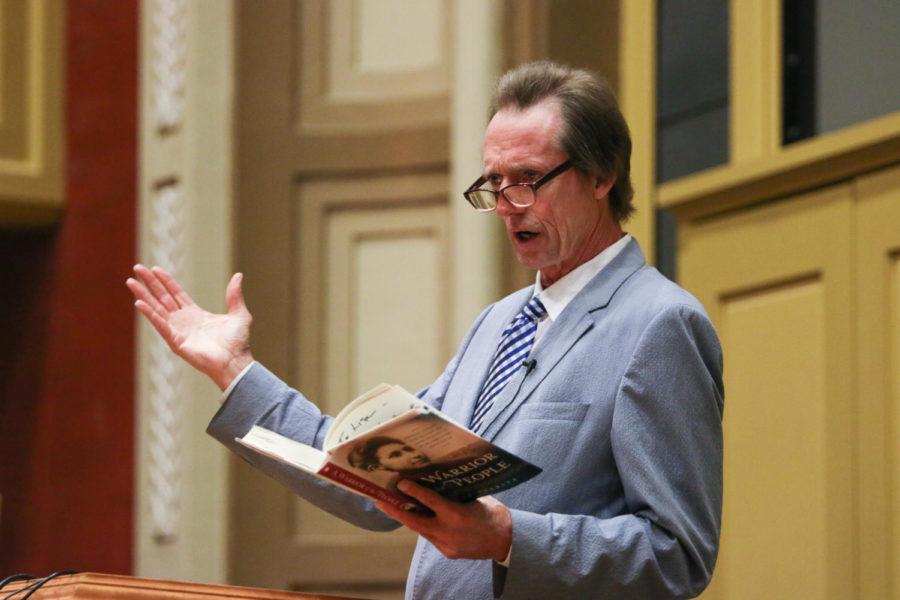Lecturer tells the story of the first Native American doctor
Emily Blobaum/Iowa State Daily
Joe Starita, author and professor of journalism at the University of Nebraska-Lincoln, reads an excerpt of his book ‘A Warrior of the People’ during a lecture in Curtiss Hall April 10. The book is one of three that Starita has written about the Native American community.
April 10, 2017
A good story can entertain an audience, but a true story can inspire.
Joe Starita, professor of journalism at the University of Nebraska-Lincoln, spoke Monday at Curtiss Hall and told the story of Susan La Flesche, who became the first Native American doctor on March 14, 1889.
La Flesche is the subject of his latest book, “A Warrior of the People: How Susan La Flesche Overcame Racial and Gender Inequality to Become America’s First Indian Doctor.”
The story of La Flesche captivated Starita, and he dedicated himself to learning about her and the account of her life.
“I was determined at all cost to make sure I was doing everything possible to tell her story,” Starita said. “She was a meticulous diarist, journalist, letter writer, so I spent months with an industrial strength vacuum cleaner running across the landscape of every state historical society, every university she ever went to, every school she ever went to, just vacuuming up every piece of paper that I could get my hands on that had the name Susan La Flesche on it.”
The commitment Starita had to telling La Flesche’s story was not lost on the audience.
“I could tell he had a great passion for what he was writing, and personally, as a journalist, I thought that was amazing, especially the getting up at 3 a.m. to write,” Courtney Carstens, junior in journalism and mass communication, said.
The opportunity to write about La Flesche also gave Starita the chance to write about a part of American history that is not often represented.
“She is representative, in my opinion, of the most underrepresented bandwidth in America’s ethnic quilt and that is Native American women,” Starita said.
This story also gives provides a different lens to view the history of the American West. The view that we see of the American West has always been framed through the lenses of men. We know about the American West because of Crazy Horse, Custer, Buffalo Soldiers and Buffalo Bill Cody, Starita said.
This book gives the reader an opportunity to experience the American West through a woman who had to overcome ethnic and gender obstacles to be the first American Indian doctor.
Starita’s previous work has garnered much critical acclaim. During his time as part of the Miami Herald’s investigation team, one of their articles regarding impoverished and illiterate Haitians being used to extort insurance companies into settling bogus auto claims was a Pulitzer Prize finalist in local reporting. Starita’s book, “The Dull Knifes of Pine Ridge – A Lakota Odyssey,” was also nominated for a Pulitzer Prize, according to his biography from the University of Nebraska-Lincoln. In 2011, Starita received the Leo Reano Memorial Award, acknowledging his work toward the education and achievement of equal opportunity for American Indians, according to the National Education Association.
Starita will donate all royalties from this book to a college scholarship fund he has established for Native American high school graduates, according to Macmillan Publishers.
















